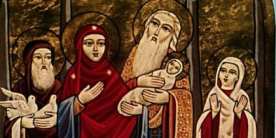
Candlemas – rooted in prayer and worship. A sermon for Adel Parish Church, Jan 30th 2022.
Luke 2: 22 – 40
I wonder what picture comes into your mind when someone mentions Nuns or monks? These days maybe ‘Call the Midwife’, but otherwise perhaps pious, probably elderly, men and women who spend their time praying – and have little connection to real life.
In November I went for two nights with my college prayer group to Sneaton Castle in Whitby, home to the nuns of the Order of the Holy Paraclete. The only other guest was a journalist looking at the convent way of life and its relevance today…she asked us for our opinions.
We’re all clergy. Exhausted by the continuing challenges of covid, on top of normal parish life, we spoke of the joy of going to a place where there’s a constant cycle of prayer. Of being able just to slip into that, be held by it. But also of being reminded that we, and the world we worry over and struggle with is held daily before God…even when we don’t find the time to do this.
Pre-covid, I went each year to Fairacres convent in Oxford for a personal retreat. I found the same river of prayer that swept me along with it. But I also found wise women with whom to explore the worries and challenges of my life. In my limited experience, nuns are steeped through and through with the problems of the world.
Their life often involves working with the forgotten of society – in prisons, in schools on deprived estates, in developing countries. But even when they retire from active physical engagement – all that time spent in prayer, with God, means they have a perceptive and detailed picture of the world’s problems, and God’s actions in the world. And you know that what’s shared in the convent stays in the convent!
Today is Candlemas, the day the baby Jesus was brought into the Temple to be presented, offered, to God. It’s also a story of the importance of prayer – of waiting on God.
To most of the people in the Temple that morning, this was just another poor couple celebrating the safe arrival of a baby…no different to hundreds of others. But two people, Simeon and Anna, saw in that baby God’s promise of salvation.
Simeon was ‘guided by the Holy Spirit’ to be there that day. We’re told he was ‘devout’, I suspect that means he spent enough time in the Temple, with God, to recognise the Holy Spirit’s guidance when it came.
Anna was an elderly prophet. She never left the Temple – but spent her time worshipping there day and night. She too recognised God’s work when she saw it.
I feel very much that the religious life has a place in today’s world…the existence of people focused on prayer and worship somehow supports us as we seek to follow Christ here. It also serves as a reminder that the Christian faith starts and ends in worship.
It’s by spending time in prayer, song, silence, with Jesus that we give him chance to speak into our lives. Spending time with God in worship means that, like Simeon and Anna, we’re more likely to recognise his voice amongst the everyday.
People often talk about how it’s possible to be a Christian without belonging to a church. It is of course – but I know I couldn’t do it. For most of us, being part of a worshipping community is how we gradually root our lives in Christ.
Today is Candlemas – there’s a lovely Candlemas tradition of the people bringing their candles for the rest of the year into church to be blessed. This was in the days when candles were the only lights they had. So this meant bringing the thing that enabled them to see, that guided their lives, into church to be part of their worship. A reminder that time spent in church in worship is part of our everyday life. We may still have ‘Sunday best’ clothes, but we don’t need ‘Sunday best’ selves – everything can be brought to God in worship.
But of course, once the candles were blessed, they were taken home to be used. Some were kept for times of special need – Candlemas candles were lit in times of anxiety, when people were ill, to light the final journey of the dying. But others were used to light mundane everyday tasks.
We have a different relationship with candles today, but the tradition has something to teach us…that we need to bring ourselves, our whole lives into this place of worship, and we need to do it whenever we can. We need regular time with God, and God’s blessing if we’re to live as Christians in our increasingly complex world.
And having received God’s blessing – we don’t leave it here, but take it back into every part of our lives. If we let him, Jesus will light our anxious moments, our illnesses, our death beds. But even more – he will light our everyday lives, our family relationships, our jobs, our leisure…and they will be better for it.
There are two things I’d like to end with.
If you have the chance, think about going ‘on retreat’; and perhaps think about finding a religious house to visit. I’m going to Sneaton on my own for part of next week – to spend time with God. It’s a wonderful way to regain perspective, to allow yourself to be ‘guided by the Holy Spirit’.
And for the rest of our year, or if a retreat’s not possible at the moment, let’s remember those Candlemas candles. Let’s bring our lives – joys, sorrows, decisions, anxieties and all – into church in worship as often as we can. And then let’s take that worship out into the rest of our week – to sustain us and light our way.
Candlemas is a time when we turn from the crib to the cross. We can do that because, like Simeon and Anna, we find in Jesus the light and salvation that makes sense of life.
